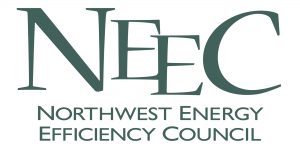Washington Legislature
The Washington legislative session is in high gear (or as high as it will get until the revenue forecast is updated in late March). Technically, bills must have passed out of their committee of origin by now, though creative lawmakers can always resuscitate the dead. NEEC is closely watching a number of energy efficiency related bills and once again proposed legislation to modify the state’s I-937 requirements leads the way in the number of bills introduced. As has been the case since the initiative’s passage, concerns about the renewable portfolio requirements dominate the discussion. In general, those concerns have been that the RPS requires utilities to purchase resources before they are needed, that the statute does not recognize hydropower as a qualifying renewable resource, and new this year a linkage of the cost implications of compliance with the RPS and its impact on energy affordability for low income ratepayers and small businesses. NEEC has consistently offered over the past 3 years, the idea that conservation in excess of a utility’s biennial target could be used to meet all or a portion of that utility’s renewable standard. This change would allow a lower cost compliance alternative for the utility while not reducing the total amount of clean energy to be acquired as contemplated by the current statute. As a small but hopeful sign of progress, this feature is now a component of some of the bills currently under consideration.
However, the politics of I-937 haven’t shown great evidence of changing. Environmental organizations remain opposed to most if not all of the current bills, including the NEEC idea. The issue cuts across political parties, the state’s geography, and public and private utilities so the probability for a bill that could pass the House and Senate and get a Governor’s signature seems small.
The Legislature is also considering a couple of pieces of legislation related to building codes. HB 1618 would increase the fees collected on permits that fund the State Building Code Council. SB 5495 would expand the State Building Code Council from 15 to 17 members with two new representatives coming from owners of rental properties (this is seemingly a fire code/sprinkler issue). SB 5378 would move the state from its current 3 year code adoption cycle by limiting “substantial changes” to every six years.
The state’s capital budget will be one of the last pieces of legislation to gel in this session. After a revenue forecast and agreement on an operating budget (fingers crossed), the state can complete its fiscal mission by developing and passing a capital budget. In each of the last three years, Rep. Hans Dunshee, Chair of the House Capital Budget Committee has championed a commitment of capital funds for investment in energy efficiency projects in K-12 schools and other municipal and public buildings. This effort has been very successful in leveraging state dollars for too long delayed infrastructure improvements in our public buildings, creating jobs and delivering operating savings through better energy performance. (Curiously, the success of this effort is garnering more national attention than it is support from local environmental organizations.) NEEC is pushing for another tranche of capital dollars in this session to continue these investments.
Oregon Legislature
The Oregon Legislature has also hit its stride jumping into action a few short weeks after Washington State. There are a number of bills currently introduced this session dealing with energy issues. Most of these bills are remanded to House Energy and Environment Committee, ably chaired by Rep. Jules Bailey. Of particular note is HB 2436 which makes some technical fixes to the Energy Efficiency and Sustainable Technology (EEAST) loan program. HB 2437 provides a tax credit for the purchasers of an energy efficient home. HB 2801 is a NEEC inspired bill that improves the language related to the calculation of cost effectiveness of energy efficiency. Long trapped by a narrowly drawn individual measure based cost effectiveness calculations, this bill would expand the frame for that determination to the whole building level. This change would apply to projects funded by the Energy Trust of Oregon. Finally, HB 2237 is a Governor’s request bill that would reauthorize Oregon’s low carbon fuel standard. This bill does not directly affect the energy efficiency industry but it is expected to use a lot of the air time in 2013 session.
